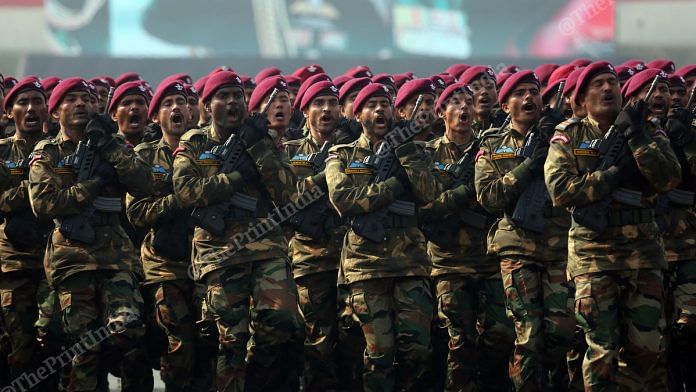New Delhi: Defence expenditure towards pensions could go down in the next fiscal with Finance Minister Nirmala Sitharaman Monday announcing an allocation of Rs 1.15 lakh crore for defence pensions, down by 13.4 per cent from Rs 1.33 lakh crore allocated in the last financial year.
The reasons for the move, defence ministry officials said, include an overprovisioning of funds for pensions and also arrears around Rs 18,000 crore that featured in the defence pensions allocations last year. Salaries and pensions are based on actuals, so they can be provided for when the need arises, an official said.
The lesser allocation towards pensions could also be a fallout of the continued freeze of dearness allowance, that is in place till June this year. Further, it could have accounted for the government’s plans to increase the retirement age of armed forces personnel, defence sources said.
In November last year, a note from the Department of Military Affairs (DMA), headed by Chief of Defence Staff General Bipin Rawat, had proposed an increase in the retirement age of colonels (other than that of the Army Medical Corps and Military Nursing Service) to 57 years from the current 54.
The retirement age of brigadiers was proposed to be increased to 58 years from the current 56 years and that of the major generals to 59 years from the current 58. No change has been proposed for the lieutenant general rank, which is 60 years.
An Army officer explained to ThePrint that in the short term, increasing the retirement age of armed forces personnel will reduce defence pensions as a significant chunk of personnel who were to retire will not immediately. “Given that there is a shortage of officers, those who continue to serve will offset the existing vacancies and also stop the re-employment of personnel,” the officer said.
Also read: Defence capital budget sees 19% jump, Finance Commission calls for non-lapsable fund
Defence pensions
In the last 2020-21 financial year, defence pensions had shot up by a significant 13.6 per cent to Rs 1.33 lakh crore over the previous fiscal. They had also made up 28 per cent of the total defence budget of Rs 4.71 lakh crore in 2020-21.
The Rs 1.15 lakh crore allocated this fiscal makes up 24 per cent of the total defence budget of Rs 4.78 lakh crore.
However, while Rs 1.33 lakh crore was allocated for pensions in the 2020-21 fiscal, the revised estimates stood at Rs 1.25 lakh crore with the final bill being pegged at Rs 1.15 lakh crore.
The estimates for pensions and other retirement benefits showed a decrease of 11.7 per cent in the Army, a 21.3 per cent drop in the Navy and a decrease of 23.3 per cent in the Air Force.
The pensions and other retirement benefits component in the budget includes pensionary charges in respect of retired defence personnel (including Defence civilian employees) of the three services — Army, Navy and Air Force — and Ordnance Factories among others. It covers payment of service pension, gratuity, family pension, disability pension, commuted value of pension and leave encashment, among others.
Also read: Make short service lucrative, raise retirement age: CDS plan to reduce defence pensions
Why the decrease?
Lt Gen Satish Dua (retd), former Chief of Integrated Defence Staff, told ThePrint that the fine print of how this year’s pension allocation would play out remains to be seen.
“One reason is that the proposal of increasing the retirement age of the armed forces personnel is expected to go through. If that happens, nearly 50,000 people could be affected and that does affect the pensions budget significantly,” he said. “It has to be seen if the defence pensions budget has factored in this aspect.”
Secondly, he said, there are several civilians who are paid out of the defence ministry estimates, including for pension. “The defence forces have long been demanding that civilians’ pension should not be included in forces’ pension,” he said. “It remains to be seen if there is some change in that.”
“There is also the fact that when pensions are calculated, there ought to be some overcalculations,” he added. “These may be sorted out in the defence pension estimates this year.”
Lt Gen Rakesh Sharma (retd) told ThePrint: “It is possible that the arrears, which were being paid after the 7th Central Pay Commission to pensioners or OROP, could have carried over in the financial year 2019-2020. That also reduces the defence pension budget somewhat.”
“It is also possible that the calculations were in excess of what was actually required in the last year, and hence it was adjusted this year,” he added. “There are also savings in the DA (dearness allowance) that have been held back for FY 2019-20 after the pandemic, which would have resulted in savings.”
Also read: Army’s proposed ‘Tour of Duty’ recruitment model could be expanded to Navy and IAF too



